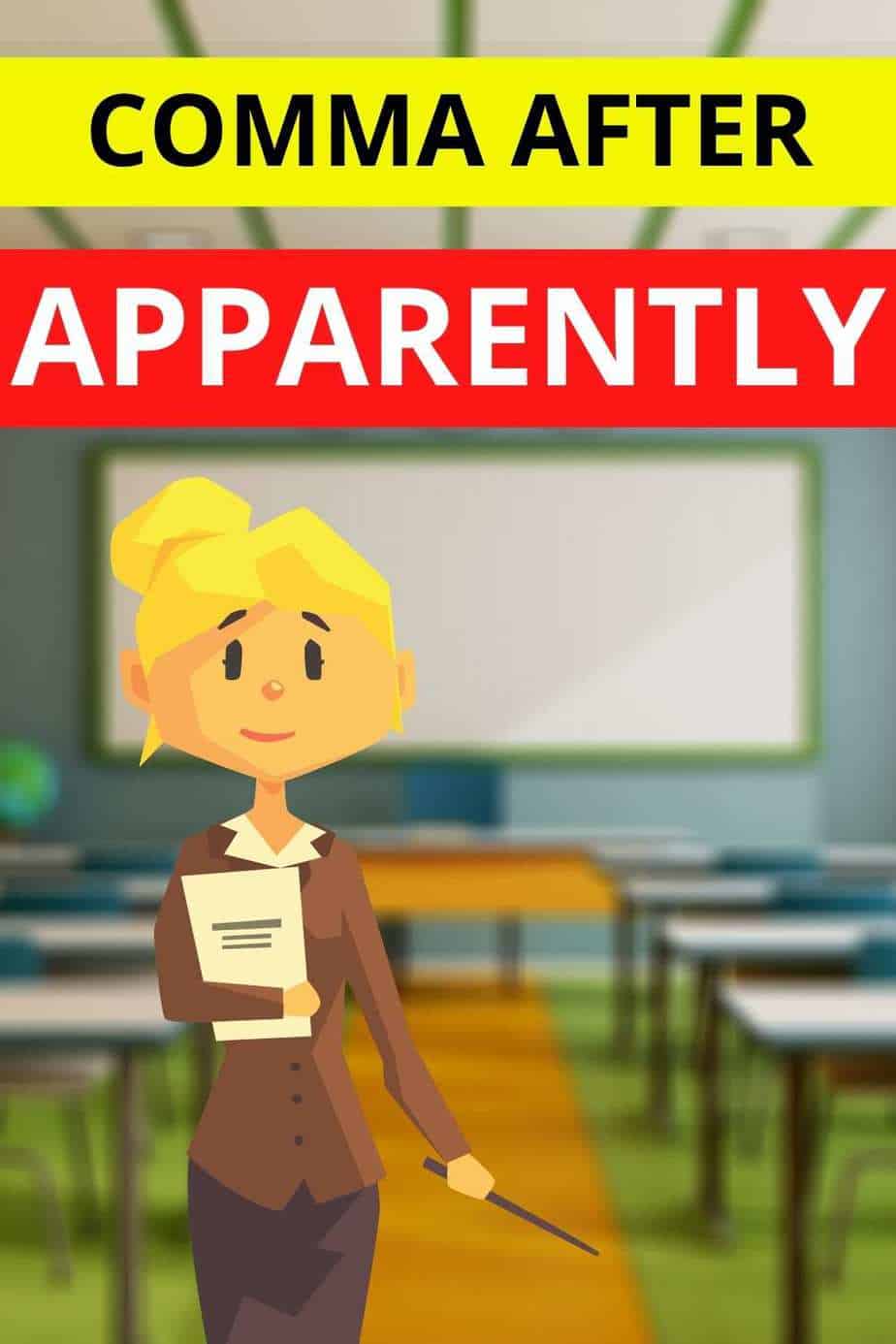The use of adverbs implies higher-order language processing as they are generally more complex than nouns and verbs.
Since adverbs can have multiple functions, they are categorized into various types according to grammatical use.
One way to express linguistic content richness is by means of intensification via adverbs of emphasis.
Read on to further understand how the intensifier apparently is punctuated with a post-comma in sentences.
[toc]
Do we need a comma after “apparently”?
The answer to the question depends on some stylistic and syntactic guidelines. A comma after “apparently” is used when it acts as a sentence-initial disjunct and when it is used as the last word either in an introductory expression or parenthetical statement. On the flip side, no post-comma is attached when it acts as a general adverb premodifying a verb, adjective, or another adverb. Similarly, an after-comma is unnecessary when it functions as a sentence-final disjunct or when it implies a rather weak form of interruption.

What does “apparently” mean?
“Apparently” is an adverb of emphasis, also called an intensifier, that could either mean “obviously” or “seemingly” depending on the intent.
It is of Latin origin derived from the term apparens, an adjective referring to the English word “appearing.”
This particularly means that speakers and writers typically use the term when describing an inference or assumption based on how events occur.
Put more simply, “apparently” is used to highlight the truth evaluation or observation according to how an incident or concept looks like.
Apparently, the dog is stressed because it is tucking its tail and averting its eyes.
In the example above, we can understand that the claim is based on the presupposition that anxious dogs may exhibit the mentioned behaviors.
Therefore, the assumption may or may not be exactly true but is at least valid and proximally-relevant to the truth.
Comma after apparently
The comma placement after “apparently” is dictated by both stylistic and syntactic guidelines.
A subsequent comma may appear when “apparently” behaves as a sentence-initial disjunct.
It may also contain a post-comma when it serves as the final term in an introductory expression.
Thirdly, an after-comma placement may also be done when it is used as the final word in a parenthetical interruption.
Sentence-initial disjunct
Disjuncts are grammatically-insignificant adverbs that modify the whole sentence, hence also referred to as sentence adverbs.
They usually appear either in front or at the end of a sentence.
The two major roles of disjuncts are to express the writer’s mood towards the style or on the content of an utterance.
In particular, “apparently” falls under the second type which is linguistically known as a content disjunct.
Content disjuncts aim to create inferences or observations based on the truth value of a statement.
Sentence-initial disjuncts relatively imply stronger implicature and interruption than sentence-final disjuncts as they prompt readers on what to expect afterward.
As disjuncts are rhetorically-relevant yet grammatically-unimportant, they are set off with commas to mark the segregation from the remaining sentence parts.
Ergo, a post-comma placement is necessary when used as a sentence-initial disjunct.
To note again, although disjuncts are grammatically-removable, caution is advised for language learners since its removal may entail a more conclusive implication.
Introductory expression (final word)
Correspondingly, disjuncts may be extended to increase the level of implicature intended.
This means that a disjunct may also be simply referred to as an introductory expression in a sentence.
Taking the same punctuation rule, a disjunctive introductory expression containing “apparently” as the final word requires an after-comma placement as well.
Introductory sentence elements are useful in providing initial context to the upcoming information that sets a reader’s expectation beforehand.
Parenthesis (final word)
In stylistics, a parenthesis is a form of thought insertion that aims to drive persuasion in discourse.
Parenthetical elements, such as words, phrases, or fragments, are peripherally inserted, which means they are thereby grammatically-dispensable.
Parentheses are functionally similar to disjuncts as their main purpose is to add interesting and relevant information that enhances discursive content.
These devices are also offset with commas whenever they appear in texts so as to indicate the grammatical irrelevance.
Consequently, a comma should be inserted after “apparently” when it is used as the final term in a parenthetical expression particularly inserted midway.
When should we not put a comma after “apparently”?
Since adverbs can modify verbs, adjectives, or other adverbs, apparently may be placed almost anywhere in the sentence.
When a writer aims to use adverbs of emphasis to modify adjacent words, an after-comma placement is not required.
Also, a pre-comma rather than a post-comma is necessary when apparently is used as a sentence-final disjunct.
Lastly, the post-comma may be omitted in informal texts especially when the interruption is weak nonetheless.
When “apparently” functions as a verb modifier
Interestingly, one rather easy way to remember the function of adverbs is to think that they are “adjectives for verbs.”
Using an adverb to qualify the verb means that the writer aims to concentrate the emphatic effect on the verb rather than other sentence constituents.
When “apparently” modifies the main verb in a sentence, a comma is inessential and, thus, not used as a general rule.
In the example below, the subject’s act of preparation ostensibly receives the intensity denoted by “apparently.”
When “apparently” works as an adjective modifier
Another major function of adverbs is to modify adjectives within a sentence.
When this happens, the emphasis denoted by the adverb consequently shifts to the adjective it premodifies instead of the other sentence elements.
Commas on either side are also insignificant in this case, which is represented by the next example.
A speaker may describe a conversation as “apparently useless” when the other interlocutor is disinterested or absent-minded.
When “apparently” modifies an adverb
Most adverbs may also be used to modify other adverbs, and this is also applicable to the intensifier being discussed.
Similar to the previous explanations, the intensifying function of “apparently” transfers to the adverb being modified.
The example below uses an indefinite temporal adverb whose meaning is dependent on the context and the writer or speaker’s reference point.
Additionally, the use of “a while ago” is linguistically known as temporal deixis, which simply means pointing via language by means of relative time.
When “apparently” is used as a sentence-final disjunct
Referring back to the first post-comma guideline in this text, a disjunct may also appear at the end of a sentence.
Sentence-final disjuncts are also separated by a pre-comma for textual convenience.
Since this disjunctive position marks the termination of the sentence, a period rather than a post-comma is rather used.
Weak disjunctive interruption
In informal registers, disjunctive elements are not necessarily offset by an after-comma.
This is particularly because a post-comma placement may ruin the rhythm of evidently brief statements and interruptions such as in the example below.
The question-and-answer dialogue above is especially found in a textual speech representation of a casual conversation.
Therefore, this type of sentence construction is not typically observed in legal nor scholarly texts, but rather in roleplay scripts or novel books instead.
Comma after apparently: Conclusion
Adverbial intensification entails linguistic literacy as well as the desire to express hyperbolical intention among language users.
Although several intensifiers have already become buzzwords or filler words in modern-day English, they are nevertheless crucial in the thought representation process.
This, then, further implies that less ordinary intensifiers should be encouraged in pedagogical practices to balance the counter-productive effects.

Hey fellow Linguaholics! It’s me, Marcel. I am the proud owner of linguaholic.com. Languages have always been my passion and I have studied Linguistics, Computational Linguistics and Sinology at the University of Zurich. It is my utmost pleasure to share with all of you guys what I know about languages and linguistics in general.

